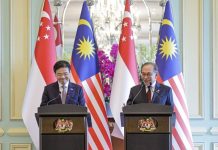- Anti-Fake News Bill tabled, proposes a fine of RM500,000 & up to 10 years jail
- Property prices in Malaysia on the Decline
- Uber and Grab are coming together
- Foreign participation at MIHAS 2018 opens up business opportunities for locals
- UOB Malaysia Retains Its Positive Outlook on the Ringgit
- World first game cryptocurrency payment alliance launched

Anti-Fake News Bill tabled in Dewan Rakyat
The Anti-Fake News Bill 2018 aimed at curbing the dissemination of inaccurate news and putting in place deterrent measures was tabled for first reading in the Dewan Rakyat today. The bill was tabled by Minister in the Prime Minister’s Department Datuk Seri Azalina Othman Said. According to the Bill, the proposed Act aims to protect the public from the rapid spread of fake news while ensuring respect for the right of freedom of speech and expression under the Federal Constitution. It interprets the inaccurate news as any kind of news, information, data and reports published which, in part or whole and in whatever form including write-ups and visual or audio recordings, are false. Once the Bill is passed, anyone found “knowingly creating, offering, publishing, printing, distributing, circulating or disseminating” any fake news or publication containing it is liable to a fine up to RM500,000 or imprisonment up to 10 years or both. In the case of a continuing offence, a person is liable to a further fine of up to RM3,000 for every day during which the offence continues after conviction. In addition to the punishment, the Court may also order for an apology, such as in open court or by publishing it in newspapers, for example. Anyone who is found to provide financial assistance for the purposes of committing or facilitating the offence is also liable to a fine up to RM500,000 or imprisonment up to 10 years or both. The Bill also states that any person who fails to remove publications containing fake news is also liable to a fine up to RM100,000 and in the case of a continuing offence, to a further fine up to RM3,000 daily during which the offence continues after conviction.
PropertyGuru: Property Prices On the Decline
The PropertyGuruMarket Index (“PMI”) which tracks the asking prices of homes in Malaysia shows a continued decline in the 4thquarter of 2017 as the market continues to correct itself – amidst a complex scenario of growing oversupply in certain property segments and prevailing consumer unaffordability. For Q4 2017, the PMI indicated a decrease of 1.6 percent compared to the previous quarter (Q3 2017: 0.2 percent decrease). In a year-on-year comparison, prices have declined by 3.7 percent. Save for June, February and October, all other months in 2017 showed a decline in asking prices across all classes of residential properties. The PMI is derived from PropertyGuru’s extensive proprietary data, which includes (but is not limited to) the asking prices of over 250,000 residential property listings onPropertyGuru.com.my. According to PropertyGuru Malaysia Country Manager, Sheldon Fernandez, the declining trend is consistent with prevailing market sentiments and that the on-going price correction is healthy for the residential sector in the medium and long-term. According to PropertyGuru’s latest consumer sentiment survey – released in January this year, consumer satisfaction has improved to 38 percent with 57 percent of Malaysians intending to buy in the next six months – up from 52 percent. Fernandez also added that with unaffordability continuing to be a major issue, there is greater downward pressure on asking prices.
Grab confirms acquisition of Uber in Southeast Asia
Grab announced that it has acquired Uber’s Southeast Asia operations, confirming earlier reports of the merger. Grab said it will integrate Uber’s ridesharing and food delivery business in the region into its platform. “With the combined business, Grab will drive towards becoming the number one online-to-offline mobile platform in Southeast Asia and a major player in food delivery.” As part of the acquisition, Uber will take a 27.5 per cent stake in Grab and Uber CEO Dara Khosrowshahi will join Grab’s board. It will take over Uber’s operations and assets in Singapore, Malaysia, Cambodia, Indonesia, Myanmar, the Philippines, Thailand and Vietnam. In a media release, Grab said Uber drivers and riders, as well as Uber Eats customers, partnering eateries and delivery partners will be migrated to the Grab platform. The Uber app will continue to operate for two weeks until April 8, after which riders will have to download the Grab app and register for an account to use the service. The data customers previously shared with Uber – excluding payment information – will also be transferred to Grab, although it will not be visible in the Grab app.
Foreign participation at MIHAS 2018 opens up business opportunities for locals
The participation by international exhibitors, which took up 37 per cent of the 1,100 booths at the Malaysia International Halal Showcase 2018 (MIHAS 2018), is expected to open up opportunities for local companies to expand their businesses at the global level. The number of exhibitors has improved and so far over 800 exhibitors had registered compared with 612 the previous year, said Malaysia External Trade Development Corp Chief Executive Officer, Dr Ir Mohd Shahreen Zainooreen Madros. He said the increasing number of international participants, alongside the big players in the market, including VISA, Mastercard, Fraser and Neave, QSR Holdings Bhd, would do good for the local players. “We have an Islamic finance cluster this year, so this would benefit the small and medium enterprises as they are able to access information directly and potentially collaborate with the big guys and as for these international and financial providers, they can see a variety of halal products and services available in the country,” he told the media in Kuala Lumpur. MIHAS 2018, scheduled to be held on April 4-7, 2018 at the Malaysia International Trade and Exhibition Centre, is a component of World Halal Week 2018, which began today.
UOB Malaysia Retains Its Positive Outlook on the Ringgit
The United Overseas Bank (Malaysia) remains positive on the outlook for the Malaysian Ringgit over the next six to 12 months, despite expectations of greater market volatility in the near term. The Bank expects the Ringgit to strengthen to 3.80 against the US Dollar by year-end, supported by Malaysia’s strong economic fundamentals and the effective regulation of the onshore foreign exchange market. According to Ms Julia Goh, Economist at UOB Malaysia, growing tension around US trade tariffs may trigger renewed market volatility. The possibility of more rapid reduction of the US Federal Reserve’s balance sheet and a faster pace of interest rate rises in the US may also add further pressure to currency markets. However, Ms Goh expects the Malaysian Ringgit to be less susceptible to sharp spikes in volatility compared with other regional currencies given it is supported by favourable domestic growth drivers. “We expect the Ringgit to benefit from Malaysia’s steady flow of private sector investment and higher private consumer consumption levels. Improvements to the labour market, higher nominal income from previous years, and rising affluence among Malaysians have helped strengthen private consumption levels in Malaysia. The country’s fiscal measures, such as personal tax cuts, cash aid and budget giveaways provide further support for consumer spending. In addition, continued global economic expansion will drive trade and investments, and provide overriding growth support for Malaysia,” said Ms Goh.
World’s first game cryptocurrency payment Alliance announced its formal launch, with partnership of 100 global top game manufacturers
Game cash foundation and the 100 top game manufacturers in the world jointly launch the world first game cryptocurrency payment alliance, name as GAME CASH (GSH). The alliance members come mainly from the game manufacturers in China, Japan, South Korea, the United States, the EU, South East Asia and other major gaming markets, including industry research institutions. GSH, from the date of its establishment, aims to build up a new consensus mechanism of the industry by using blockchain technology revolution, in which all the global industry resource will be integrated, to establish a common cryptocurrency payment system. This payment system will make all the gaming channels connected to fully solve the sore points from the industry and the game players. The gaming industry has been developing vigorously in the past 10 years, but there are endless kinds of malpractices, black box operations, security and user privacy issues, payment problems, etc. With the emergence of GSH alliance, these problems will be solved once and for all.
























